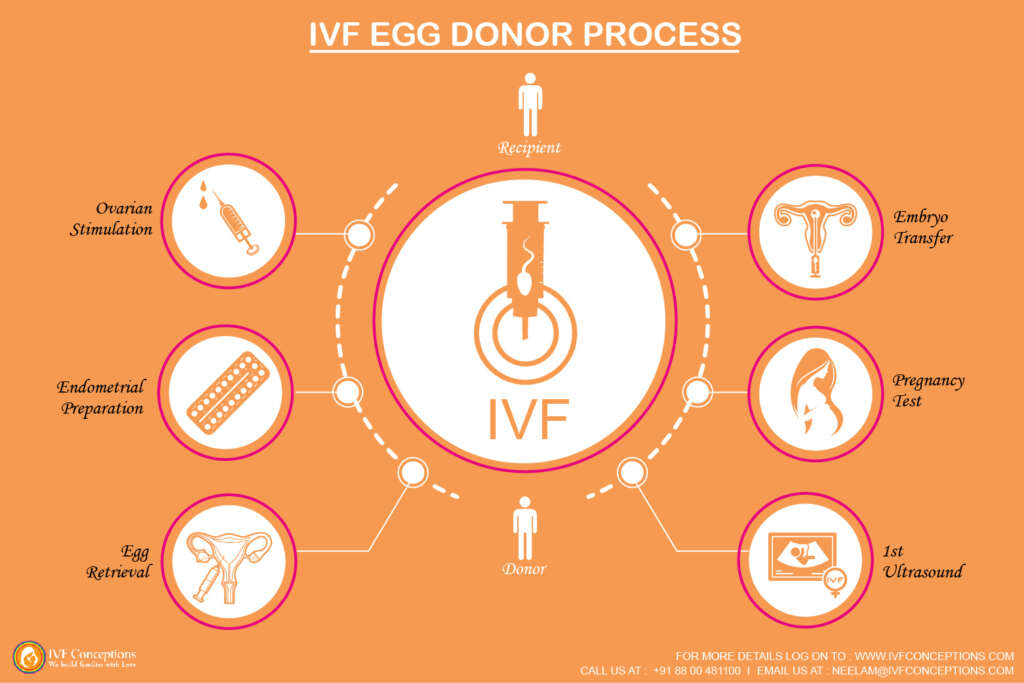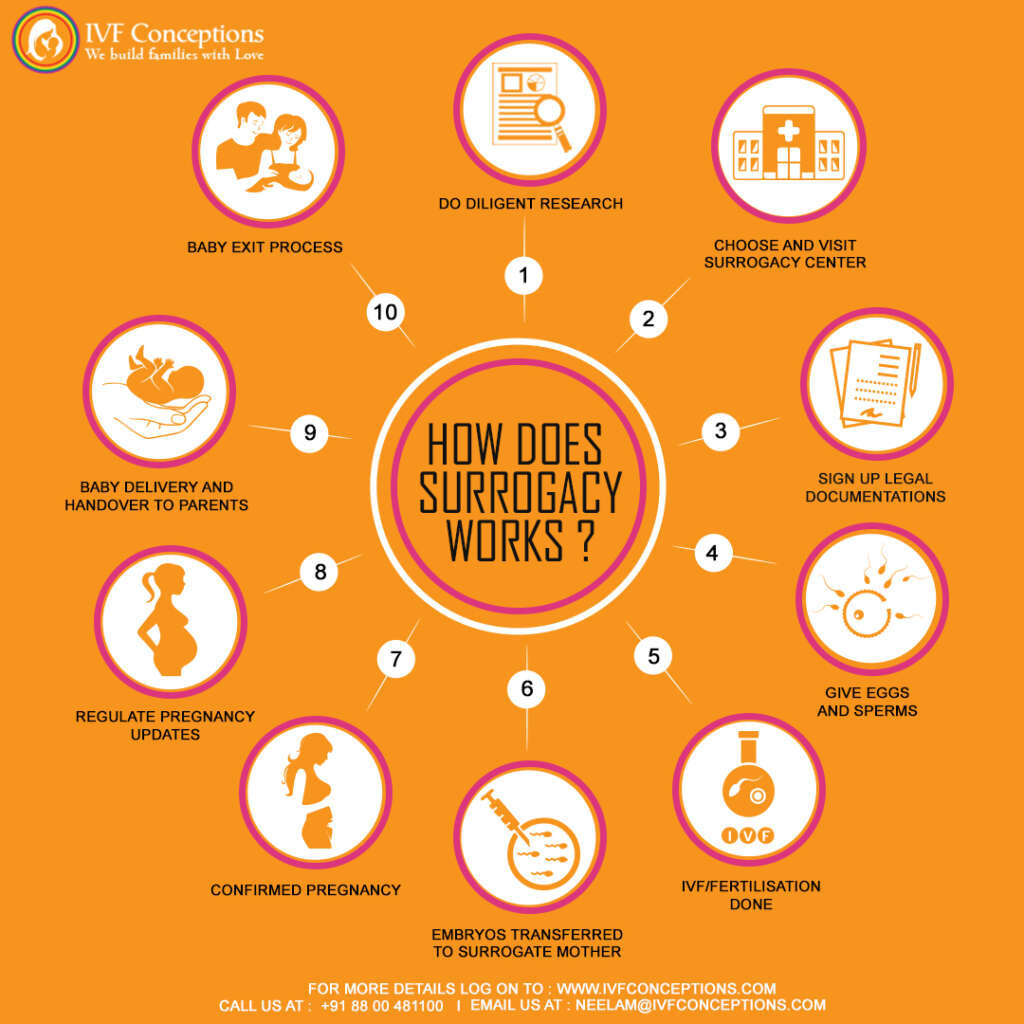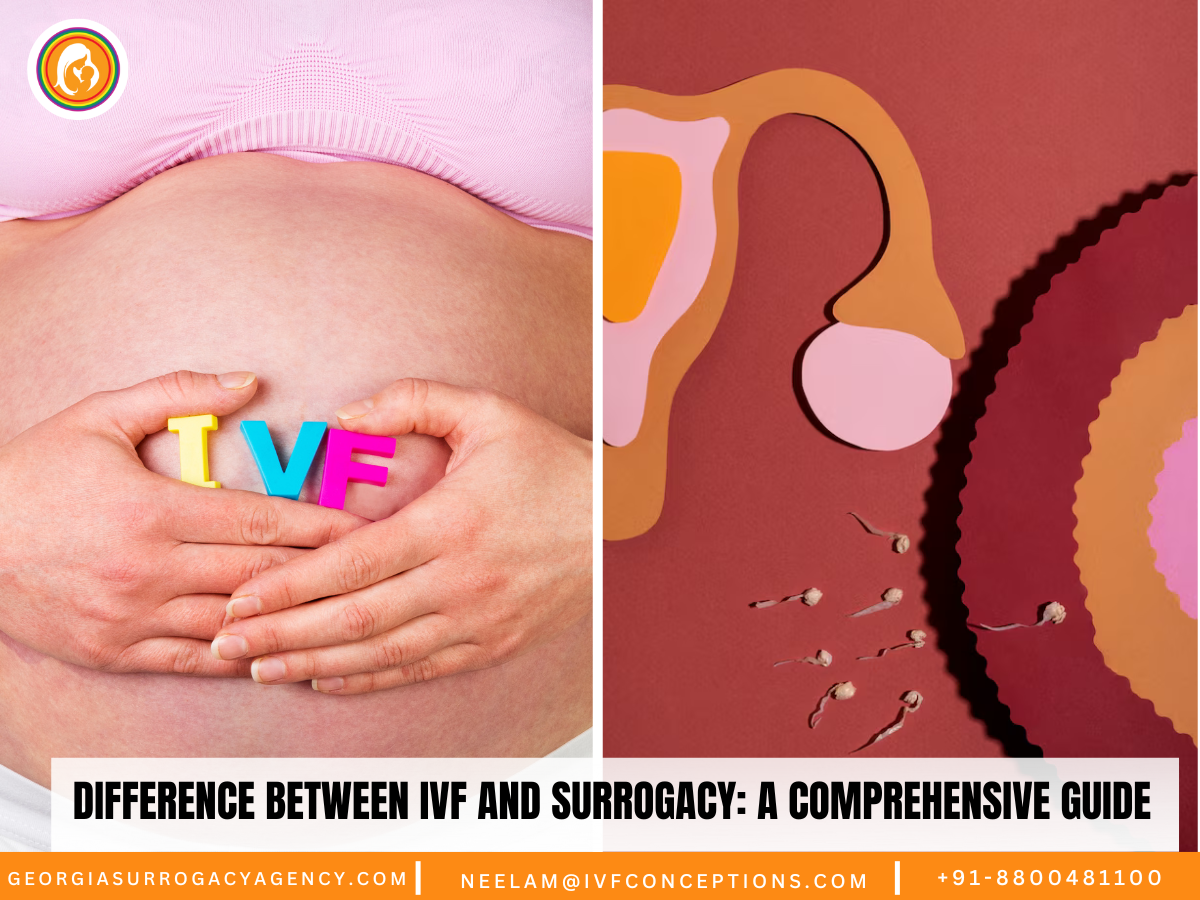Difference Between IVF and Surrogacy: A Comprehensive Guide
Do you know what sets in vitro fertilization (IVF) apart from surrogacy? As technology helps more couples who face infertility or genetic issues, the choice of how to start a family grows. But how do you pick the right way for you? This guide will teach you the key differences, helping you choose wisely and get closer to having the family you want.
- Book an online appointment: Get a free online consultation.
- Call\W:+91-8800481100 Email:neelam@ivfconceptions.com
Feeling like you’re missing out on the chance to raise a child because of infertility or genetic problems is tough. Thanks to today’s medical breakthroughs, there are ways to overcome this. IVF and surrogacy are among the top options. They both aim to fulfill your dream of having a child. But, they differ in how they work and what to expect. So, which choice fits your situation the best?
Additional Resources to Read:
Understanding Gay Surrogacy Costs – A Guide
Understanding Surrogate Age Requirements
Independent vs Agency Assisted Surrogacy: Compare and Choose
Surrogacy in Colombia: A Comprehensive Guide for Intended Parents
Getting ready to start your journey to parenthood can be stressful. But, this guide is here to help you understand the differences between IVF and surrogacy. It will guide you to the option that matches your needs and feelings. Are you excited to learn about these solutions and their unique advantages?
Key Takeaways
- IVF and surrogacy are two distinct assisted reproductive technologies with unique procedures and success rates.
- The key difference lies in the genetic connection with the child and the overall complexity of the process.
- IVF may be the preferred choice for couples with infertility conditions or those seeking genetic testing.
- Surrogacy may be the better option for couples with medical conditions preventing pregnancy or those experiencing recurrent pregnancy loss.
- Factors like cost, time frame, and legal implications should be carefully considered when choosing between IVF and surrogacy.
Understanding IVF and Surrogacy
In assisted reproductive technology, IVF and gestational surrogacy are key. They help intended parents in different ways to have children.
What is IVF?

IVF means fertilizing an egg and a sperm in a lab, not in the body. The process starts with the mother-to-be taking medicines to make several eggs. These eggs get fertilized with sperm.
Doctors then choose the best embryos to place back into the uterus. Doing this increases the chance of a successful pregnancy.
Success Rate of IVF
IVF’s success rate depends on the mother’s age, egg and sperm quality, and health. The CDC notes a 50% live birth rate in US IVF cycles.
What is Surrogacy?

Surrogacy uses a surrogate mother to carry the pregnancy for someone else. With gestational surrogacy, the baby is not biologically connected to the surrogate. An embryo made from the intended parents’ or donor’s genes is placed in the surrogate’s womb.
Success Rate of Surrogacy
Surrogacy’s success varies by the surrogate’s age and health, embryo quality, and clinic expertise. In the US, the live birth rate for gestational surrogacy is about 75%.
Difference Between IVF and Surrogacy
In vitro fertilization (IVF) and surrogacy assist couples who wish to become parents using different methods. It’s crucial to know these differences. They help you pick the option that fits your goals best.
IVF lets the parents use their own eggs and sperm to conceive. The mother then carries the pregnancy. This way, the child is genetically connected to them. Surrogacy involves a surrogate mother carrying the baby. She can use donated eggs or sperm. This means there’s no direct genetic link to the intended parents.
In IVF, the legal and financial sides are usually simpler. The parents have all the legal rights. Surrogacy, on the other hand, can be legally complex. It depends on the state and often needs detailed legal agreements. These protect the rights of the intended parents.
The emotional journeys are different too. With IVF, the mother goes through the pregnancy. This can be emotionally rewarding. Surrogacy can bring its own emotional challenges. The intended parents must work closely with a surrogate mother.
In the end, both IVF and surrogacy are powerful ways to start a family. Yet, they vary in genetics, legal issues, and emotional stress. Understanding these differences helps you make the right choice for you and your family.
When to Choose IVF?

In vitro fertilization (IVF) might be best if other treatments haven’t worked. It’s good for couples dealing with certain infertility issues or those looking for genetic testing. Knowing when IVF works best can help you decide for your family’s future.
Couples with Infertility Conditions
If infertility is because of blocked tubes, endometriosis, or male issues, IVF could help. This method lets eggs meet sperm in a lab, avoiding these issues. This increases the chance of having a baby.
Couples Seeking Genetic Testing
IVF is a key choice for couples wanting a healthy baby. It lets you check the embryos for any genetic problems before implanting the best one. Choosing the healthiest embryo improves the child’s chance of being healthy.
Couples Not Benefiting from Other Treatments
IVF could be the right path if other methods like IUI haven’t worked. It’s a stronger approach for couples not helped by simpler treatments. IVF offers a bigger chance to overcome infertility.
| Reason to Choose IVF | Explanation |
| Infertility Conditions | IVF bypasses reproductive challenges like blocked fallopian tubes, endometriosis, and male factor infertility. |
| Genetic Testing | IVF allows for preimplantation genetic testing to identify any genetic abnormalities or inherited disorders. |
| No Success with Other Treatments | If other fertility treatments like IUI or ovulation induction have not worked, IVF may be the next step. |
When to Choose Surrogacy?
 For some couples, surrogacy is the top choice for starting their family. It can be a great fit for many reasons.
For some couples, surrogacy is the top choice for starting their family. It can be a great fit for many reasons.
Gestational surrogacy offers a way for intended parents to have a child when they face tough medical issues or can’t carry a child. It’s a big help for couples dealing with problems that stop pregnancy or cause them to lose a baby.
-
Couples with Medical Conditions Preventing Pregnancy
Gestational surrogacy is a key answer when health issues make carrying a child risky or impossible. For example, when a parent has a health problem like heart disease, a surrogate can carry their baby safely.
-
Couples with Recurrent Pregnancy Loss
Surrogacy is a hopeful choice for those who have had a hard time getting pregnant or holding a pregnancy. With a surrogate, the baby gets a safe space to grow, making the chance of a healthy birth higher.
-
Couples Not Benefiting from Other Treatments
If other fertility treatments didn’t work, surrogacy could be the bridge to a family. It lets the child be related to the parents biologically through their own egg or sperm.
-
Single males who are looking to grow their family
There are many single males who wish to grow their family but need a help of a gestational carrier to assist to carry the pregnancy for them. So, they need IVF, egg donor and surrogate mother to complete their family.
-
Gay couples who wish to become father

The desire of having a child is natural in all human being. Same goes for LGBT+ community. With the help of assisted reproduction technique like IVF and third party reproduction services like Surrogacy, it is possible to have a biological baby for gay couples.
Comparing IVF and Surrogacy
When we dive into assisted reproductive methods, IVF and surrogacy stand out. Both aim to make it possible for families to have children. But each has unique features that make them different from each other.
Procedure Differences
IVF starts with combining the egg and sperm of the parents in a lab. Then, the embryos are placed in the mother’s womb. Surrogacy, however, relies on a carrier. In this case, the surrogate mother hosts the embryos, which are from the parents or a donor.
Time Frame Differences
IVF usually takes 4-6 weeks to complete, making it a quicker option. Surrogacy, though, involves a longer process. This is because it includes finding a surrogate, legal steps, and the pregnancy itself. This journey can take months or a year.
Cost Differences
The costs of IVF and surrogacy are also quite different. IVF can cost between $12,000 and $15,000 for each try. Surrogacy, on the other hand, is much more expensive. It can go over $100,000. This cost includes legal fees, medical care, and payment for the surrogate mother.
Success Rate Factors
Their success varies based on several factors. The age and health of the parents, the egg and sperm quality, and the clinic’s skill all play a role. Thus, IVF has a success rate of 30-40% for each attempt. Surrogacy’s success can be from 40% to 75%, depending on the situation.
| Comparison Factor | IVF | Surrogacy |
| Procedure | Fertilization of intended parents’ gametes in a lab, followed by embryo transfer to the intended mother’s uterus | Use of a surrogate mother to carry the pregnancy, with the embryo(s) created from the intended parents’ or donor’s gametes |
| Time Frame | Approximately 4-6 weeks | Several months to a year |
| Cost | $12,000 to $15,000 per cycle | $100,000 or more |
| Success Rate | Around 30-40% per embryo transfer | 40% to 75%, depending on specific circumstances |
The Key Difference Between IVF and Surrogacy
The main difference between in vitro fertilization (IVF) and surrogacy is the genetic link with the child. IVF lets the parents have a genetic bond with the child. Surrogacy, on the other hand, uses a woman who carries the child, usually using the parents’ eggs or sperm.
In IVF, the mother’s eggs and father’s sperm are used to make an embryo. This embryo is then put into the mother’s womb. So, there’s a direct genetic link between the child and the parents. However, surrogacy might involve a gestational surrogate. Or, it might use a traditional surrogate, where the surrogate’s own egg is fertilized with the father’s sperm.
Deciding between IVF and surrogacy depends on many things. This includes your medical condition, legal obligations, and money skills. It also involves your emotions and what you prefer. People who can’t get pregnant due to a medical condition or have lost pregnancies might choose surrogacy.
At the end of the day, IVF and surrogacy differ in their genetic link with the child. And in how tough the processes can be. These differences affect the journey for parents. They also influence the legal and money aspects of this path.
Conclusion
Both in vitro fertilization (IVF) and surrogacy help infertile couples start families. They differ in how they work, their genetic connections, laws, and emotions.
When choosing between IVF and surrogacy, consider what you want, your health, and money. IVF is good for those needing help with infertility or wanting to check their genes. Surrogacy works for people with health issues that make carrying a baby hard, or if they’ve lost pregnancies before.
Choosing either method means you must understand the legal implications. Both IVF and surrogacy involve other people in making a baby. By looking at the good and bad of each, you can make a choice that meets your needs for starting a family.
If you’d like to learn more about IVF, Egg Donation, or surrogacy services globally, check out the rest of our website at Georgia Surrogacy Agency. We offer legally secure and affordable surrogacy consulting services for FREE.
Our team has over 14 years of experience facilitating surrogacy arrangements, egg donation, and serving as an advocacy resource for infertile couples and LGBTQ individuals seeking to build families.
For more resources on IVF and Surrogacy, browse our other web page- IVF Conceptions.
For more resources on IVF and Surrogacy, browse our other web page- Complete Surrogacy.
FAQ for Difference Between IVF and Surrogacy
What is the difference between IVF and surrogacy?
IVF means having a child through fertilization in a lab. The mother’s eggs and the father’s sperm are used. On the other hand, surrogacy involves another woman, the surrogate, carrying the child for the parents.
Who is a good candidate for IVF?
IVF is good for infertile couples, those needing genetic testing, and who found other treatments ineffective.
Who is a good candidate for surrogacy?
Surrogacy helps those with pregnancy-preventing medical conditions, recurrent loss, or with unsuccessful fertility treatments.
What are the key differences between IVF and surrogacy in terms of procedure, time frame, cost, and success rate?
The processes in IVF and surrogacy differ. IVF is done in a lab, surrogacy has a woman carry the baby. Surrogacy takes more time and costs more. Success rates vary for both, depending on different factors.
What is the main genetic difference between IVF and surrogacy?
The main genetic difference is clear. In IVF, the baby is genetically the parent’s child. In surrogacy, this may not be the case. It depends on the use of donated eggs and/or sperm.
Source Links

Highly esteemed, authoritative, and trusted professional with a 14-year of experience in international surrogacy. Advocate for Secure, Legal, and Affordable International Surrogacy.
Neelam Chhagani, MA (Counselling Psychology) and Holistic Infertility and Third-Party Reproduction Consultant.
Member of European Fertility Society, Best Surrogacy Blogger of 2020, with 300 dedicated blogs, and top contributor on Quora for Surrogacy.


Add Your Comment